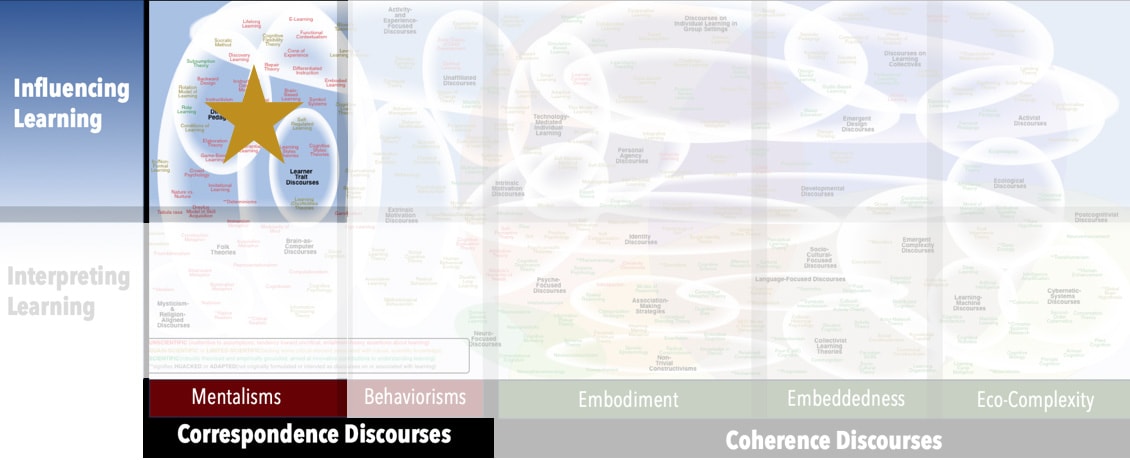Focus
Developing flexible, adaptable understandings of complicated phenomenaPrincipal Metaphors
- Knowledge is … repertoire of established facts
- Knowing is … flexible application of understandings
- Learner is … a meaning-maker (individual)
- Learning is … constructing
- Teaching is … diversifying material
Originated
1960sSynopsis
Cognitive Flexibility Theory is asserted to be among Non-Trivial Constructivisms, concerned with learning in complex domains in which ill-structured situations are common, such as history, biology, law, and medicine. “Cognitive flexibility” refers to the ability to spontaneously reconfigure one’s understandings in ways to adapt to novel and dynamic situations, and so goals of teaching include highlighting interconnections and avoiding oversimplifications. The emphasis in instruction is thus on many case studies examined from multiple perspectives, typically enabled through interactive technologies. Relevant subdiscourses include:- Random Access Instruction (Rand Spiro, Paul Feltovich, 1990s) – a teaching approach based on Cognitive Flexibility Theory that revolves around multiple and diverse case studies and revisiting material at different times, for different reasons, and from different perspectives. Teachers are advised to use of technologies that enable flexible restructuring of information, linkages among elements, and varied modes of representation.
- Reductive Bias (Rand Spiro, 1960s) – an over-simplification by a learner of a complex concept, which may inhibit the development of a sophisticated understanding
Commentary
While its authors assert Cognitive Flexibility Theory to belong among Non-Trivial Constructivisms, their choice of vocabulary (e.g. representations of information, retrieval, transfer) reveal a stronger affiliation to Cognitivism. Thus, while proponents may be recommending sound pedagogical practice, it is not rooted in or founded on a sound theory of learning.Authors and/or Prominent Influences
Rand J. Spiro; Paul J. Feltovitch; Richard L. CoulsonStatus as a Theory of Learning
Cognitive Flexibility Theory is not a theory of learning, although it develops an important principle of learning that many perspectives on teaching ignore – namely that flexible and transferable understandings are enabled by diversified learning experiences.Status as a Theory of Teaching
Cognitive Flexibility Theory is a theory of teaching.Status as a Scientific Theory
There is evidence to support Cognitive Flexibility Theory as an approach to teaching. The theory is not, however, associated with an extensive or nuanced research program, and so it relies on evidence bases from associated domains. In addition, proponents typically do not demonstrate a sophisticated awareness of learning theories, especially around claims that Cognitive Flexibility Theory is appropriately included among Non-Trivial Constructivisms.Subdiscourses:
- Reductive Bias
- Random Access Instruction
Map Location

Please cite this article as:
Davis, B., & Francis, K. (2022). “Cognitive Flexibility Theory” in Discourses on Learning in Education. https://learningdiscourses.com.
⇦ Back to Map
⇦ Back to List
